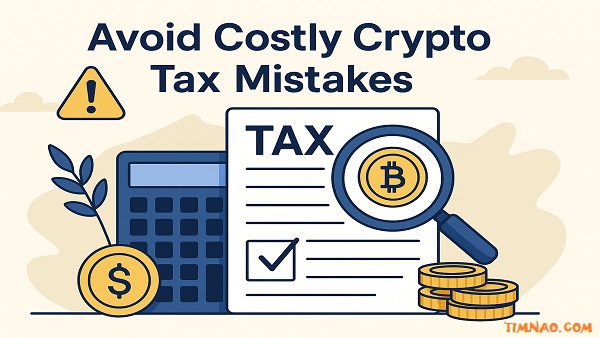🚨 Avoid These Costly Mistakes: The Ultimate Crypto Tax Guide for 2025 💸
Cryptocurrency has revolutionized investing—but when tax season arrives, even the most enthusiastic crypto traders can feel lost. That’s why understanding crypto taxation is no longer optional—it’s essential.
Whether you’re trading Bitcoin, staking altcoins, or flipping NFTs, the IRS is watching closely. This crypto tax guide for 2025 will walk you through everything a beginner needs to know—without the jargon, fear, or frustration.
📚 Table of Contents
- 🧠 Why a Crypto Tax Guide Matters More Than Ever
- 💰 What Counts as Taxable Crypto Activity? (You’ll Be Surprised)
- 📉 Capital Gains vs. Ordinary Income: What’s the Difference?
- 🔍 How to Track and Report Every Transaction Like a Pro
- 🌍 Crypto and the IRS: What They’re Watching in 2025
- 🛠️ Must-Have Tools for Crypto Tax Reporting
- 💼 When to Hire a Pro (and How Much It Really Costs)
- 🧩 Tax Tips for DeFi, NFTs, and Staking
- 🌐 How Different Countries Tax Crypto in 2025
- 🚨 Crypto Audits and Red Flags: What Triggers an IRS Knock
- 📆 Smart Tax Strategies for 2025 and Beyond
- 📚 Staying Ahead: Keeping Up with the Laws That Keep Changing
🧠 Why a Crypto Tax Guide Matters More Than Ever
The explosive growth of digital assets—Bitcoin, Ethereum, Solana, NFTs—has drawn the attention of investors, creators, and regulators alike. But with opportunity comes responsibility, especially when it comes to cryptocurrency taxation.
In 2025, ignoring your crypto taxes can lead to more than just a slap on the wrist. We’re talking:
- Hefty IRS penalties
- Frozen accounts
- Legal trouble
Why so serious? Because in the eyes of the IRS and most tax authorities around the world, crypto isn’t “magic internet money.” It’s property—and taxable.
And as governments roll out stricter tracking and reporting rules, especially around DeFi, NFTs, and cross-border wallets, staying compliant isn’t just smart—it’s non-negotiable.
💡 Quick Stat: In 2024, over 57% of U.S. crypto investors failed to report at least part of their digital asset activity.
If you’re serious about growing your portfolio and protecting your profits, learning the basics of how crypto is taxed is the best place to start.
💰 What Counts as Taxable Crypto Activity? (You’ll Be Surprised)
Here’s the catch: it’s not just selling crypto that the IRS wants to know about.
You could trigger a taxable event without even realizing it. Here’s what counts as taxable activity in 2025:
| Action | Taxable? | Type |
|---|---|---|
| Selling crypto for fiat (USD, EUR) | ✅ Yes | Capital gain/loss |
| Trading crypto for another (e.g., BTC → ETH) | ✅ Yes | Capital gain/loss |
| Buying goods or services with crypto | ✅ Yes | Capital gain/loss |
| Getting paid in crypto (freelance or job) | ✅ Yes | Ordinary income |
| Receiving airdrops or hard forks | ✅ Yes | Ordinary income |
| Staking or mining rewards | ✅ Yes | Ordinary income |
| Transferring between your own wallets | ❌ No | Not taxable |
| Holding crypto (no sale/trade/use) | ❌ No | Not taxable |
Many people are shocked to learn that trading one crypto for another (e.g., selling ETH to buy SOL) is a taxable event—even if you never convert to cash.
🧾 Pro Tip: Every time you sell, swap, spend, or earn crypto—write it down. You’ll need the cost basis, fair market value, and date of transaction.
📉 Capital Gains vs. Ordinary Income: What’s the Difference?
Here’s where things get technical—but stay with us.
1. Capital Gains (or Losses)
These come from buying and selling crypto like an investment. If you bought ETH at $1,000 and sold it at $1,500, you have a $500 capital gain.
Two types of capital gains:
- Short-Term (held < 1 year): Taxed like your income (up to 37% in the U.S.)
- Long-Term (held ≥ 1 year): Lower tax rates (0%, 15%, or 20%)
2. Ordinary Income
This applies when you earn crypto. Think mining rewards, staking yield, airdrops, or getting paid in crypto for freelance work.
You report it as regular income—at the market value when you receive it—and pay income tax accordingly.
🧮 Example: You mined 0.1 BTC worth $3,000 in May. That’s $3,000 of income—taxable when you received it.
🔍 How to Track and Report Every Transaction Like a Pro
If you’re serious about crypto, here’s one truth you need to live by:
📋 “If you don’t track it, you can’t report it—and if you can’t report it, the IRS will find you eventually.”
Unlike traditional stock brokers, most crypto exchanges do not send you clean, simple tax forms. It’s up to you to collect and organize your transaction data.
🧾 What You Need to Track for Each Transaction:
- Date and time of the transaction
- Type of transaction (buy, sell, trade, earn, spend)
- Asset involved (BTC, ETH, NFT, etc.)
- Amount transacted
- Cost basis (what you originally paid)
- Fair market value at the time of the transaction
- Gains or losses (difference between cost and FMV)
This might sound tedious, but it becomes manageable with the right system—or better yet, the right tool.
🔧 Recommended Tools for Tracking Crypto Transactions
Here are some of the most trusted crypto tax tracking platforms available in 2025:
| Tool | Best For | Features |
|---|---|---|
| Koinly | Beginners | Auto-imports from 750+ wallets/exchanges |
| CoinTracker | Investors & tax pros | Real-time portfolio + tax reports |
| ZenLedger | DeFi & NFT traders | Specialized reports for staking, NFT gains |
| CryptoTaxCalculator | Advanced users | Great for complex, high-volume traders |
These platforms connect directly to your wallets and exchanges (e.g., Coinbase, Binance, MetaMask, Ledger), import your data, and generate ready-to-file reports like Form 8949 and Schedule D.
📚 What Forms You’ll Likely Need:
- Form 8949: Reports capital gains/losses
- Schedule D: Summarizes total capital gains
- Schedule 1 (Form 1040): For ordinary income like mining or airdrops
- Form 1099-MISC or 1099-NEC: If you were paid in crypto as a contractor
💡 Pro Tip: Even if you didn’t get a 1099 form from a platform, you still must report the income. “No form” ≠ “No taxes.”
By automating your reporting process with smart software, you reduce stress, avoid audits, and sleep better at night—knowing your crypto taxes are accurate and compliant.
🌍 Crypto and the IRS: What They’re Watching in 2025
2025 marks a turning point in crypto IRS rules—the agency is no longer playing catch-up. They’re ahead of the curve, using advanced blockchain analytics to enforce compliance.
🔥 The IRS Now Uses AI to Track Wallets and Trades
You might think your transactions on a decentralized wallet or foreign exchange are private, but think again.
The IRS partners with companies like Chainalysis and TRM Labs, which use artificial intelligence and blockchain data to:
- Monitor public wallet addresses
- Identify suspicious activity
- Flag large, unreported transfers
- Link pseudonymous addresses to real-world identities
If your wallet or transaction history raises a red flag, expect an IRS letter—or worse, a full audit.
📄 What the IRS Added to Tax Forms in 2025:
- The first page of IRS Form 1040 now asks:
“At any time during 2025, did you receive, sell, send, exchange, or otherwise acquire any financial interest in any digital asset?”
You must answer this question truthfully. A “yes” flags your return for digital asset scrutiny.
- New Form 1099-DA (Digital Assets) is being rolled out. Exchanges like Coinbase, Kraken, and Robinhood are required to issue this to users, reporting your annual crypto activity—just like a stock broker would.
⚠️ Common Mistakes That Trigger IRS Attention:
- Failing to report crypto-to-crypto swaps (e.g., ETH → SOL)
- Not claiming airdrops, forks, or staking rewards as income
- Using multiple wallets without consolidating reports
- Ignoring NFTs, especially those flipped for profit
- Claiming massive losses without proper documentation
🚨 Real Case: In 2023, the IRS sent warning letters to over 10,000 U.S. crypto users who failed to report taxable events on decentralized exchanges.
🛡️ What You Should Do Now:
- Be proactive, not reactive. Keep detailed records.
- Use crypto tax tools to compile data across platforms.
- Don’t rely on “off-the-record” wallet activity to go unnoticed.
- If you’re unsure—get professional help early.
The IRS is not against crypto—they just want their share. Understanding what they’re looking for is your best defense.
🛠️ Must-Have Tools for Crypto Tax Reporting
Crypto trading doesn’t stop at buying low and selling high. The real challenge comes when it’s time to report your transactions accurately. But here’s the good news: you don’t have to do it alone.
In 2025, there’s a powerful arsenal of crypto tax software designed to automate, simplify, and organize your crypto tax journey.
🧰 Top Crypto Tax Tools You Need in 2025
Here are the industry’s most reliable tools that help beginners and pros stay compliant and stress-free:
| Tool | Best For | Standout Features |
|---|---|---|
| Koinly | Beginners | Auto-syncs with 700+ wallets, DeFi & NFT support, clean reports |
| CoinTracker | Portfolio builders | Real-time value tracking, mobile app, strong Coinbase integration |
| TokenTax | High-volume traders | CPA access, DeFi tracking, margin trading & tax-loss harvesting |
| ZenLedger | U.S. taxpayers | TurboTax integration, NFT and staking support, audit trail |
| CryptoTaxCalculator | DIY experts | Advanced reconciliation, custom categorization, supports 100+ countries |
📌 Pro Tip: Most of these tools offer free versions or trial runs—start there to see which one fits your workflow.
🔗 What These Tools Actually Do:
- Auto-import transactions from exchanges and wallets
- Identify taxable events (buy/sell/trade/stake/etc.)
- Calculate capital gains and income based on market data
- Generate tax forms like Form 8949, Schedule D, and more
- Detect missing transactions and reconcile inconsistencies
- Save time and prevent expensive mistakes
Whether you’re a casual investor or deep in DeFi, these tools can save you hours of work and help you avoid costly penalties.
📍 Don’t Forget:
- Most tools let you export reports for your accountant.
- Many now support DeFi, NFT, staking, and lending activities.
- Features like real-time portfolio value and smart alerts help with year-round planning.
Using these tools isn’t just about tax filing. It’s about knowing your numbers, optimizing your gains, and staying audit-ready 24/7.
💼 When to Hire a Pro (and How Much It Really Costs)
Let’s face it—DIY is great, but crypto taxes can get messy, fast. If you’ve been asking:
“Do I need a tax pro for my crypto, or can I do this myself?”
Here’s the truth: most beginners can start with software. But if you check any of the boxes below, it’s time to call in an expert.
🔎 You Might Need a Pro If You:
- Made 100+ trades or use multiple exchanges and wallets
- Engage in DeFi, NFT flipping, or yield farming
- Run a crypto mining or staking operation
- Accept crypto payments for your business or freelance work
- Used non-KYC exchanges (like Uniswap or PancakeSwap)
- Forgot to track past transactions and need backfiling
- Are dealing with a crypto tax audit or IRS letter
In these cases, even the best software won’t cover the nuance and strategy a real professional can provide.
👨💼 Who Can Help With Crypto Taxes?
| Role | What They Do |
|---|---|
| Crypto CPA (Certified Public Accountant) | Tax planning, filing, audit defense, IRS representation |
| EA (Enrolled Agent) | Licensed by IRS, specializes in tax compliance & resolution |
| Crypto Tax Attorney | Legal help for complex audits or tax evasion issues |
| Tax Advisor | General tax filing, strategic guidance, can liaise with crypto software |
Many firms now offer crypto-focused tax services, and you’ll find professionals familiar with NFTs, DeFi, DAOs, and tokenomics.
💰 What It Typically Costs in 2025:
| Service | Cost Estimate |
|---|---|
| Basic crypto return (few trades) | $300 – $750 |
| Moderate (50–200 trades, staking, DeFi) | $750 – $2,000 |
| Complex (high-frequency, business use, NFTs) | $2,000 – $5,000+ |
| IRS audit defense | $250+/hour (or retainer-based) |
💬 “Paying a pro is like insurance for your portfolio. One mistake avoided could save thousands.”
📈 Bonus: Tax Planning, Not Just Filing
A qualified crypto tax pro will help you:
- Strategize holding periods for long-term capital gains
- Plan for tax-loss harvesting
- Use retirement or trust accounts for tax deferral
- Navigate multi-year or international tax complexities
If your crypto is more than just a hobby—or if you’re aiming for serious gains—it’s smart to get expert help to keep more of what you earn and reduce audit risk.
🧩 Tax Tips for DeFi, NFTs, and Staking
If you’ve ventured into DeFi, flipped some NFTs, or earned rewards through staking, congrats—you’re on the frontier of crypto. But guess what? So is the IRS. And they’ve got their eyes on all three.
Let’s break down what you need to know in 2025—plus smart moves to stay compliant and avoid paying more than you should.
🏦 DeFi (Decentralized Finance) Tax Tips
DeFi has exploded in popularity, but it also comes with complex tax implications. Here are some of the most common activities—and how they’re taxed:
| DeFi Activity | Is It Taxable? | How It’s Treated |
|---|---|---|
| Lending crypto | ✅ Yes | Interest is ordinary income |
| Borrowing crypto | ⚠️ Sometimes | No tax unless liquidation occurs |
| Yield farming/liquidity mining | ✅ Yes | Rewards = income at receipt |
| Token swaps on DEXs | ✅ Yes | Treated as a sale (capital gain/loss) |
| Earning governance tokens | ✅ Yes | Taxed as income |
🔍 Pro Tip: Even if you’re using MetaMask or TrustWallet anonymously, DeFi transactions are still visible on-chain—and traceable.
Tips:
- Use tools that track DeFi protocols, like CoinTracker or Koinly.
- Document each reward received and its market value at the time.
- Remember that gas fees may be deductible if they’re part of a taxable transaction.
🎨 NFT Tax Tips
The IRS now classifies NFTs (non-fungible tokens) similarly to crypto, but with extra complications.
Buying an NFT? Not taxable.
Selling or flipping an NFT for crypto? ✅ That’s a taxable event, and the gain is subject to capital gains tax.
Receiving an NFT as a reward or promotion? ✅ That’s ordinary income, based on its fair market value at receipt.
And here’s the tricky part: NFTs might be taxed as “collectibles”, especially if tied to digital art. That means higher capital gains rates—up to 28% in the U.S.
📌 Example: You bought an NFT at 1 ETH (worth $2,000), and sold it for 2 ETH ($4,000). You have a $2,000 gain—potentially taxed at a higher rate if classified as a collectible.
Tips:
- Save a screenshot of the NFT + transaction hash for documentation.
- Track creator royalties, as those may affect your cost basis.
- Watch out for airdropped NFTs—they’re taxable at their market value when received.
🌱 Staking and Validator Rewards
When you stake crypto, you’re locking it to support a network and earn rewards—just like interest. But from a tax perspective, it’s a bit more complex.
In most countries (including the U.S.), staking rewards are treated as ordinary income, taxed at the moment you receive them—not when you cash them out.
📉 Example: You earn 10 SOL in staking rewards when SOL is $100. That’s $1,000 in income—even if you hold the SOL and it later drops in value.
Tips:
- Log the market value at the moment of each reward received.
- Some tools like ZenLedger or TaxBit automate staking income tracking.
- When you later sell those rewards, you’ll also need to report capital gains or losses from the time of receipt.
By understanding how DeFi, NFT, and staking activity is taxed, you’ll avoid surprises at tax time—and might even find ways to optimize your returns.
🌐 How Different Countries Tax Crypto in 2025
Crypto is global—but crypto taxes? They’re anything but uniform.
Let’s take a quick world tour of how the cryptocurrency taxation landscape looks in 2025 across different regions. Whether you’re a digital nomad or just hold assets overseas, this is must-know info.
🇺🇸 United States
- Crypto is treated as property (like stocks).
- All sales, swaps, and income events are taxable.
- DeFi, staking, NFTs = reportable.
- The IRS uses Form 8949, Schedule D, and new Form 1099-DA from exchanges.
🧾 Reminder: The IRS can trace blockchain activity and now requires crypto platforms to report customer transactions—so staying compliant is more important than ever.
🇬🇧 United Kingdom
- HMRC treats crypto as property.
- Capital Gains Tax applies to sales, swaps, and NFT flips.
- Income Tax applies to mining, staking, and airdrops.
- No tax-free threshold for crypto traders—every pound counts.
🇩🇪 Germany
- One of the most crypto-friendly tax systems.
- If you hold crypto for over 1 year, you pay zero tax on gains.
- Staking and DeFi rewards have more complex rules—check local guidance.
🇨🇦 Canada
- Crypto is taxed as capital gains (50% inclusion) or business income if you’re actively trading.
- Staking and airdrops are considered income.
- CRA is strict on reporting, especially for crypto business operations.
🇦🇺 Australia
- Treated as property under Capital Gains Tax (CGT) rules.
- Tax-free if used for personal purchases under AUD $10,000.
- NFTs and staking are both taxable events.
- The ATO requires detailed records of every crypto transaction.
🇵🇹 Portugal
- Known as a crypto tax haven, but things are changing.
- No tax on individual crypto gains (if not business-related).
- As of 2023, staking and business-related gains can be taxed.
- Must prove you’re a non-professional investor to qualify for exemptions.
✈️ General Advice for Global Crypto Users:
- Check double-taxation treaties (e.g., U.S. – Germany).
- If you’re a digital nomad, track your tax residency status carefully.
- Use global crypto tax software with multi-currency and jurisdiction support (like CryptoTaxCalculator or Koinly).
- Stay informed—crypto tax laws are changing fast around the world.
🌍 Pro Tip: Some countries now automatically share crypto account data across borders through agreements like CRS (Common Reporting Standard).
Whether you’re buying Bitcoin in Berlin, staking in Sydney, or flipping NFTs in New York, understanding local tax rules is essential to avoid legal pitfalls—and to keep more of your gains.
🚨 Crypto Audits and Red Flags: What Triggers an IRS Knock
Nothing strikes fear into a crypto investor’s heart like the word: audit. But with increasing scrutiny and advanced tools at their disposal, the IRS is becoming more aggressive in identifying underreported crypto activity.
The best way to protect yourself? Know what triggers an audit—and how to avoid it.
🚩 Common IRS Red Flags in 2025
Here are behaviors or mistakes that may increase your chances of being audited:
| Red Flag | Why It Matters |
|---|---|
| Leaving the IRS’s “Digital Assets” checkbox blank | This question appears on the first page of Form 1040. If left blank—or answered dishonestly—it’s a huge red flag. |
| High-value unreported trades | Large transactions that go unreported, especially on centralized exchanges, often trigger automated alerts. |
| Multiple wallet addresses and missing records | The IRS can use blockchain forensics to trace movement between wallets. Incomplete or inconsistent reporting is a warning sign. |
| Unreported airdrops, forks, or staking rewards | These are considered income, and if omitted, the IRS assumes non-compliance. |
| Using privacy coins (e.g., Monero) or mixers | These tools can imply intentional concealment of funds, leading to deeper investigation. |
⚖️ Important: You don’t have to be breaking the law to be audited. Even a small mistake or a misclassified NFT sale can lead to scrutiny.
🛡️ How to Prepare for a Crypto Audit
Preparation is your best defense. Here’s how to stay ready—even if the IRS comes knocking:
- Keep detailed records: Store every trade, transfer, staking reward, and purchase, along with timestamps and market values.
- Use a tracking tool: Crypto tax software like Koinly or ZenLedger provides an audit trail.
- Be honest: Even if unsure, disclose transactions in good faith. The IRS is more forgiving with transparent taxpayers.
- Hire help early: A CPA or enrolled agent who specializes in crypto can represent you before the IRS.
If you receive a CP2000 notice, a letter from the IRS about a discrepancy in your return, don’t panic—respond promptly with documentation.
📆 Smart Tax Strategies for 2025 and Beyond
If you’re serious about crypto investing, don’t just think about tax filing—think about tax strategy. With smart planning, you can minimize your tax bill, maximize your returns, and stay fully compliant.
🧠 Tax-Loss Harvesting: Cut Your Tax Bill
If your portfolio took a hit this year, don’t waste the opportunity.
🔄 Sell losing assets to offset capital gains—and even up to $3,000 of ordinary income.
Example: You sold ETH for a $5,000 gain and SOL for a $2,000 loss. You only owe tax on the $3,000 net gain.
Just beware of the wash sale rule. While it hasn’t been fully enforced for crypto (yet), selling and immediately rebuying the same asset could be disqualified in future regulations.
🕒 HODL for Long-Term Capital Gains
In most countries (like the U.S., UK, and Australia), holding crypto for at least 12 months qualifies you for lower long-term capital gains tax rates.
📊 Long-term rates can be 10–20% lower than short-term rates.
Smart move: Time your sales so that your holding period exceeds one year—especially for large positions.
💼 Use Tax-Advantaged Accounts
Yes, you can use crypto inside retirement accounts—if structured correctly.
- Self-directed IRAs or crypto 401(k)s allow tax-deferred growth.
- You can contribute crypto profits, then invest within the account without triggering taxes.
It’s an advanced strategy but worth exploring if you’re serious about long-term tax efficiency.
🧾 Deduct Legitimate Expenses
If you’re earning crypto from:
- Freelancing
- Running a validator node
- Operating a crypto-related business
You may be eligible to deduct business expenses, including:
- Hardware costs
- Internet service
- Gas fees for business-related transactions
- Software subscriptions
Consult a tax professional to see what applies.
📚 Staying Ahead: Keeping Up with the Laws That Keep Changing
The only constant in crypto tax? Change.
As governments adapt to the rapid growth of digital assets, laws and rules are evolving constantly. What’s legal and compliant today may not be tomorrow.
🔄 Watch for These Ongoing Changes
- Form 1099-DA is now rolling out in the U.S.—and other countries may follow.
- More DeFi protocols may be classified as securities.
- International tax data sharing is increasing via the OECD’s CRS system.
- NFTs may face new classification laws, especially as “collectibles” or IP assets.
📰 Best Ways to Stay Informed
| Resource | What It Offers |
|---|---|
| IRS Virtual Currency FAQ | Official IRS guidance |
| Koinly Blog | DeFi and NFT tax updates |
| CoinTracker Resources | Country-specific crypto tax news |
| Crypto Tax Reddit | Community advice and news |
| Twitter accounts like @CryptoTaxGirl | Real-time alerts and tax tips |
🤝 Connect With a Tax Pro Annually
Even if you DIY your taxes, meeting with a pro once a year can help you:
- Plan better for the next year
- Understand new deductions
- Catch any red flags before the IRS does
The cost is minor compared to the savings—or the risk of penalties.
🎯 Final Thoughts
Crypto taxes don’t have to be scary.
With the right knowledge, the right tools, and a proactive strategy, you can stay fully compliant, avoid penalties, and keep more of your profits in 2025 and beyond.
Whether you’re trading, staking, minting, or just HODLing—crypto taxes are here to stay. So stay informed, track everything, and make tax-smart decisions all year long.
The future of finance is decentralized, but your responsibility to report it… is very real.










Have you ever thought about adding a little bit more than just your articles?
I mean, what you say is fundamental and all. But think about if you added some great
pictures or video clips to give your posts more, “pop”!
Your content is excellent but with images and clips, this website could definitely be one of the most
beneficial in its niche. Awesome blog!
Hi, thanks for your comments.
I have thought and tried to add images and videos to the article, the time to write an article with full illustrations takes almost half a day, that’s just the illustrations, but if I add an illustration video, I have to make a video: come up with ideas, choose the creation, edit the video… It will probably take even longer.
I will try to add more illustrations with images into the article first, then add an illustration video later.